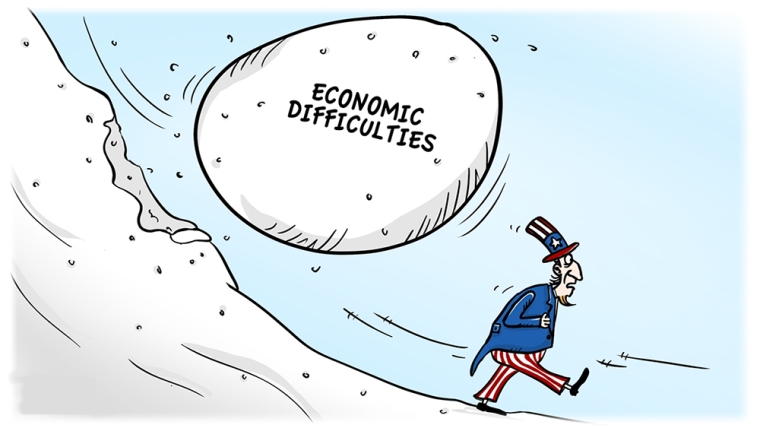
Nearly two years into the current bout of inflation, the concept of “transitory inflation” is making a comeback as the COVID-related supply shocks dissipate. This comes at a time when it is critically important to keep an open mind about the trajectory of inflation, including by avoiding an over-simplified transitory narrative that risks obfuscating the real issues facing the US economy.
“Transitory” is a comforting notion suggesting a short-lived, reversible phenomenon. Critically, the concept assumes away the need to adjust behaviors. After all, if an inflation scare is only temporary, the best way to deal with it is simply to wait it out (or, to use a policy and market term, “look through it”). That is why this narrative is particularly dangerous. By encouraging complacency and inertia, it could exacerbate an already serious problem and make it harder to solve.
The US Federal Reserve’s initial response to rising inflation is a case in point. In 2021, the world’s most powerful and influential central bank rushed to characterise higher inflation as transitory. It doubled down on this approach even after the data went against it, refusing to pivot for too long.
The Fed’s repeated mischaracterisation delayed crucial policy responses at a time when the persistence of inflation was starting to influence corporate price-setting and workers’ wage demands. As a result, the Fed not only lost credibility but also inflicted unnecessary pain on millions of American households, particularly the most vulnerable segments of the population.
While a few economists have never given up on the transitory inflation thesis, the vast majority already realised last year that it was a regrettable analytical and policy error. That makes the current re-emergence of this narrative even more perplexing.
A recent article in Politico noted that “There is also at least some reason to believe that [the economists and policymakers] who assured [Americans] that inflation would be transitory, including Fed Chair Jerome Powell, might have been kind-of-sort-of right, though the transitory period was just longer and uglier than expected.”
This is unfortunate. Not only does it force a time dimension on an inherently behavioral concept, but it also ignores the fact that the Fed’s initially fumbled response forced it into one of the most aggressive, front-loaded series of interest-rate hikes ever, including four consecutive 75-basis-point increases. Moreover, while US inflation has been slowing, it is dangerous to suggest that the problem is behind us.
Looking ahead to the rest of the year and early 2024, three possibilities stand out for me. The first is orderly disinflation, also known by critics as “immaculate disinflation.” In this scenario, inflation continues to come down steadily toward the Fed’s 2% target without damaging US economic growth and jobs. The dynamics involve primarily a labour market that avoids excessive wage increases while continuing to anchor strong economic activity. Given what else is going on in the economy, I would put the probability of this scenario at 25%.
The second scenario is one in which inflation becomes sticky. The inflation rate continues to decrease but then gets stuck at 3-4% over the second half of this year as goods prices stop declining and services inflation persists. This would force the Fed to choose between crushing the economy to get inflation down to its 2% target, adjusting the target rate to make it more consistent with changing supply conditions, or waiting to see whether the US can live with stable 3-4% inflation. I do not know what the Fed would choose in such a case, but I would put the probability of such sticky inflation at 50%, so I hope it has given this scenario some thought.
Lastly, there is the possibility of what we can label “U inflation”: prices head back up late this year and into 2024, as a fully-recovered Chinese economy and the strong US labour market simultaneously drive persistent services inflation and higher goods prices. I would put the probability of this outcome at 25%.
This is not just about multiple scenarios with no single one dominating. It is also about probabilities that must be viewed with caution. Former US Secretary of the Treasury Lawrence H. Summers captured well the prevailing mood among many economists: “It’s as difficult an economy to read as I can remember,” he recently said.
This sense of uncertainty is evident in the short-term outlook for economic activity, prices, and monetary policy, as well as long-term structural shifts like the clean-energy transition, the rewiring of global supply chains, and the changing nature of globalisation. Heightened geopolitical tensions also play a role.
Whatever happens, the worst thing we can do is fall back into complacency. Powell, after championing “transitory inflation” for too long, is now warning against it. “There has been an expectation that [inflation] will go away quickly and painlessly and I don’t think that’s at all guaranteed,” he said recently. “The base case, for me, is that it will take some time. And we will have to do more rate increases…”
Simplistic economic narratives, especially comforting ones that entice those looking for shortcuts, often mislead much more than enlighten. This was the case with the transitory inflation narrative that, while discredited in 2021-22, is now reemerging. It is also the case with those who are predicting with a high degree of confidence a US recession (I am not in that camp), only to dismiss it as “short and shallow” in order to regain their economic comfort zone.
Mohamed A. El-Erian, President of Queens’ College at the University of Cambridge, is a professor at the Wharton School of the University of Pennsylvania and the author of The Only Game in Town: Central Banks, Instability, and Avoiding the Next Collapse (Random House, 2016). Copyright: Project Syndicate, 2023, published here with permission.
15 Comments
I like El Erian, IMO he's one of the better, well balanced economists. If you agree with his article above, you may want to listen to some of his podcasts
I feel there's going to be yo-yoing for a few years.
Surplus inventory, demand destroyed, production scaled back, prices inflate, demand ramps up again, and so on until there's some sort of equilibrium.
stable 3-4% inflation
will most likely be 4-5% for most things in NZ and 6-8% for rates / water / energy. They cannot force inflation back to 2% and they know it. Gold is your friend here. Gains will be tax free. I cannot see the OCR coming back down for a long time, unless the economy hits a wall and the recession is deep, then yes OCR will come down and by then risk asset prices will have collapsed.
"gains will be tax free" That's news to me. Is it the hard stuff or some proxy like Perth Mint.
Physical
Gold is your friend here.
Wouldn't your ultimate friend be water/energy/food?
Preppers sounded like nuts right up till about 2020. Just turns out instead of a zombie apocalypse the real boogeyman is inflation.
The world is currently an extremely volatile place, environmentally, economically, politically and socially. I think it is dangerous to just assume that our current issues such as inflation will just follow some generic historic path and things will be back to 'normal' soon.
Much of the commentary we hear, politicians, economists (not directed at this article), media are simply pushing an agenda and care for nothing but themselves and their own careers/wealth. The facts are out there but it is getting harder and harder to wade through all the lies, twisted facts and BS to get to them.
Very important lessons that need to be learnt by those with power aren't and I believe that reality is going to bite many of us very hard as a result.
Never mind economic difficulties - ANZ NZ's banking system has crashed https://downdetector.co.nz/status/anz-banking/
Guess it is not waterproof or windproof?
A I don't bank with them.
B I have been sitting in spa waiting for storm.
C I am not going shopping till Monday morning so wont get caught behind a trolly owned by an ANZ customer.
Russia is turning the tide in Ukraine and the West has a long period of lobbing resources into the proxy war to slow the rout and push on with the strategy of bleeding the Kremlin.
So I can see inflation persisting, oil prices heading back up, and I agree with the article that rehabilitating the transitory rhetoric is grasping at the same straw that didn't work last time.
Work has been disincentivised by pumping up asset prices, giving us too much money chasing not enough supply and a demographic slump. It will take many painful years for things to readjust, and govts/banks will continue to pump money to try and delay as much of the pain as possible until after their watches, thereby drawing out the whole process.
I think it's very complicated out there & I for one can't pick it. We [my family] have all our eggs in the NZ basket [like most of the readers here I assume] but that is in itself, a high risk strategy these days. Our current day leaders are student-aged lunatics, although sensing the tide turning against them, they have recently recalibrated somewhat. However, I'll watch their deeds rather than listen to their words, as the past 5 years has taught me that the two don't ever seem to go together.
One the other side of half way, I continue to be frustrated by what I see. Luxon looks lost at first five with his pack & backline playing like the 2022 AB's. I know we usually vote govts out in NZ & I sincerely hope we do so again this year, but the 'blues' look void of a workable game plan, with the only one kicking goals at the moment the little fella on the right wing.
Back to the economy [stupid] we are an economy within an economy, within a larger economy, with all 3 levels doing their level best to f..... things up. All they want to do is make everything dearer, make waiting lists longer & destroy as many car parks as possible. I'm obviously wrong [pun intended] but this doesn't look like the best way forward to me.

We welcome your comments below. If you are not already registered, please register to comment
Remember we welcome robust, respectful and insightful debate. We don't welcome abusive or defamatory comments and will de-register those repeatedly making such comments. Our current comment policy is here.